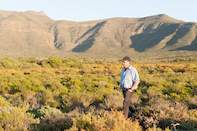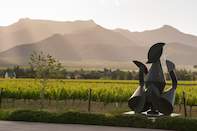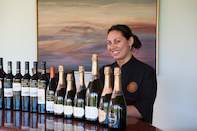The home of world-renowned Cap Classiques, this colourul avant-garde cellar offers a stylish respite on a trip into the Cape winelands’ semi-arid hinterland.
Shaking It Up

When coal-mining magnate Graham Beck bought this Robertson winery in the early 1980s, his intention was that it would produce his flagship wine: a premium sparkling wine à la Champagne. At the time, both Cap Classique and Robertson’s reputation as a fine wine area were in its infancy, but Beck, with the assistance of long-time cellarmaster Pieter Ferreira, successfully shook things up.
Having purchased the derelict farm Madeba in the semi-arid Little Karoo scrubland and then called in a fleet of earth-moving equipment to redistribute vast amounts of fertile topsoil swept away by the 1981 Laingsburg floods, Beck planted a range of classic wine grape varieties.
Ongoing research and careful monitoring of the vineyards led to today’s focus on Chardonnay, Shiraz, Pinot Noir and Cabernet Sauvignon, and limestone-rich soils produce grapes with high natural acidity required for the base wines that go into quality sparkling wine.
Unexpectedly Avant-Garde

The wines themselves are made in the avant-garde cellar that has been described by its designer, Johan Wessels, as a ‘hi-tech alien egg [that] hatched in the fynbos on the hillside’ - and its sloping green roof, burnt-orange walls and purple-pink steelwork really do echo the colours of the surrounding veld.
The tasting room is modern and minimalist, combining polished steel, granite and glass. Its elevated deck overlooks the still waters of a koi pond and an oasis of lawns, vines and indigenous acacia trees, and at one end stands an imposing angular black steel sculpture by Edoardo Villa.
There is no better place to sample some of the Cape’s finest Cap Classiques, made in the traditional Champagne method incorporating a second fermentation in bottle and using classic Champagne varieties Chardonnay and Pinot Noir (followed by a cheese, charcuterie or rainbow trout snack from the Harvest Platter menu).
Although the Brut NV (non-vintage) is excellent everyday drinking wine, it has greater claims to fame. In 1994 it was the sparkling wine of choice to celebrate Nelson Mandela’s election as president of newly democratic South Africa, and it was drunk when Barack Obama announced his candidacy for president of the United States and when he won the election in 2008.
It has subsequently received awards as SA’s top Cap Classique, notably in the annual Amorim Cap Classique Challenge, introduced in 2002 in collaboration with the Cap Classique Producers Association, formed a decade before to guide South Africa’s production of premium méthode champenoise sparkling wine.
The Brut now anchors the winery’s Non-Vintage Collection, including the Brut Rosé and the Bliss Nectar and Bliss Nectar Rosé, slightly sweeter versions made, rather rarely, as quality bottle-fermented bubblies featuring the classic Champagne duo of Chardonnay and Pinot Noir varieties and therefore offering a freshness and character seldom found in non-dry sparkling wines.
In Search of the Perfect Bubble

The flagship sparkling wine that Beck had originally envisaged proved to be a Blanc de Blancs, a sparkling wine made from pure Chardonnay.
Affirmation came when the 1999 vintage earned winemaker Ferreira the Diners Club Winemaker of the Year Award in 2004. The Blanc de Blancs Brut, together with later additions of a Pinot Noir Rosé and the Ultra Brut (formerly Brut Zero) offering a bone-dry Cap Classique for connoisseurs, form the Vintage Collection.
As Ferreira continued his ‘search for the perfect bubble’, a selection of exceptional vintages of that erstwhile ‘flagship’ Blanc de Blancs was left on the lees (after the second bottle-fermentation) to eventually be launched as the Cuvée Clive, a limited bottling of a 2003 cuvée disgorged after five years on the lees, resulting in exceptional character and richness.
Named in memory of a Beck son who died in an accident, it is only available from the cellar door. The new Artisan Collection currently comprises yet another remarkable Extended Lees Ageing bottling, degorged after 134 months on the lees with only 720 numbered bottles made available.
Following Beck’s death in 2010, son Antony, though based in the US through his involvement with the family horse-breeding enterprise in Kentucky, has guarded and built upon his father’s Cape wine-farming legacy.
The Robertson farm, with Ferreira as chief operating officer supported by long-time winemaker Pierre de Klerk as cellarmaster, is particularly active in community and conservation projects and committed to sustainable farming.
Book a vineyard tour and discover the work of Mossie Basson, Graham Beck Wines’ full-time estate and conservation manager. He oversees the farm’s nearly 2 000 hectares of rehabilitated and conserved land (including some of the Cape Floral Kingdom’s last remaining Karoo and Renosterveld tracts).
It’s the hub of the Rooiberg-Breederivier Conservancy, which encompasses some 16 000 hectares of natural vegetation across nearly 30 collaborating farms and is home to the critically endangered riverine rabbit and endangered Breede redfin minnow, with confirmed sightings of the iconic Cape leopard, brown hyena and vulnerable honey badger.
Your guide (or Mossie himself if you can wangle it) will explain that the entire wine growing, production and sales operation hinges on a five-point management program that places environmental considerations first. The farm was one of the first WWF-SA Conservation champions.
 Head across the magnificent Du Toitskloof Mountains and the vine-clad expanse of the Breede River Valley onto Route 62 , and you’ll experi...
Head across the magnificent Du Toitskloof Mountains and the vine-clad expanse of the Breede River Valley onto Route 62 , and you’ll experi...